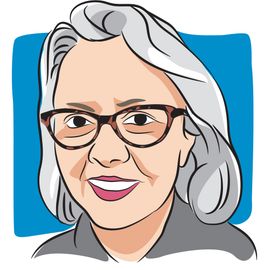- About Us
- Advertise / Support
- Editorial Board
- Contact Us
- CancerNetwork.com
- TargetedOnc.com
- OncLive.com
- OncNursingNews.com
- Terms & Conditions
- Privacy
- Do Not Sell My Information
- Washington My Health My Data
© 2025 MJH Life Sciences™ and CURE - Oncology & Cancer News for Patients & Caregivers. All rights reserved.
Contemplating AI Assistance as a Cancer Survivor

Felicia Mitchell, retired from college teaching, is a poet and writer who makes her home in southwestern Virginia. She is a survivor of stage 2b HER2-positive breast cancer diagnosed in 2010. Website: www.feliciamitchell.net
When I saw a study about using AI facial recognition in cancer decision-making headlines, I decided to try my own informal, non-scientific experiment.
My goal, like that of other cancer survivors, is not to look younger but to grow older with the ability to carry myself along on the wild ride of ageing. People may see me as a fit, active individual, but there is much more beneath the surface. I actively manage my blood sugar, monitor for signs of eye disease, cope with long-term effects of cancer treatment, and follow a lifestyle aimed at reducing the risk of recurrence. I also address challenges related to lymphedema and take steps to keep my bones from becoming too fragile. My infrastructure is age-appropriate, if not biologically older than it could be, even if my face may appear younger than my innards.
This relationship between how we look and what lies inside our bodies is why I was intrigued by a recent study on biological age versus chronological age reported in The Lancet: “FaceAge, a deep learning system to estimate biological age from face photographs to improve prognostication: a model development and validation study.” In a nutshell, the authors hypothesized that biological age, in contrast with chronological age, might help doctors with “survival prediction.” In fact, “Looking older was correlated with worse overall survival …” Would I, a cancer survivor, want the AI tool used on me? Curious, I conducted my own informal research.
I downloaded a consumer-oriented app called Face Age, not to be confused with the scientific FaceAge program used in the study. Then I analyzed a photograph from just before I was diagnosed with cancer. The biological age noted was 47, seven years younger than I was. Blame genetics or lifestyle, but I have always looked a little younger than I am. Then, thinking of the study’s point that “on average, patients with cancer looked older than their chronological age,” I chose an image from two-thirds of the way through treatment when I was 55. Face Age, despite white fuzz on my head and a tired look in my eyes, estimated 51.
We all look different for our ages, so putting that difference aside, I could say that whatever my chronological age at the time, cancer made me look four years older biologically (according to AI) than I did before diagnosis. That is not a startling idea, though, not to cancer patients and survivors. Cancer and cancer treatment are hard. The effects show up in our skin, our smiles, and the wrinkles we acquire on our faces. Fatigue and chemo will age a person. I agree with that point of the AI study.
Next, to consider how my biological age might hypothetically affect decisions about my care or prognosis today, I let Face Age analyze me at 69. One image taken when I was feeling tired said I looked 72. Another taken the very next day at the same time of day when I was more rested and smiling for the camera, while wearing lipstick, said I looked 58. The difference made me wonder about how much a subtle difference in appearance shades information encoded by AI (and humans). Could a simple smile make us appear more likely to survive?
To test my own hypothesis about how a smile might affect the way AI perceives biological age, I compared two images taken another day, one after the other. In the first, I was not smiling (age estimated at 68, a year younger than I am, not a significant difference really). In the second image taken just after the first, I was smiling, my biological age estimated at 59. This assessment, that I must look younger when I smile, makes me wonder if smiling cheerfully could subliminally influence (a) a medical assessment and/or (b) an AI program making decisions about “survival prediction.”
Read The Lancet report to learn more about the actual study, which was scientific, unlike my simplistic experiment. Although I believe this study will play an important role as medical professionals explore the use of AI in cancer care, it remains essential that we continue to advocate for ourselves, especially as AI becomes increasingly involved in decision-making. And if a smile influences how we are perceived, then perhaps making the effort to smile more often is worthwhile.
For more news on cancer updates, research and education, don’t forget to subscribe to CURE®’s newsletters here.
Related Content:



